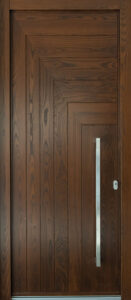Attleboro Doors are the barrier between a space and the outside world. They serve many purposes, including ensuring privacy by preventing unwanted attention from outsiders, separating areas with different functions, allowing light to pass into or out of a space, controlling ventilation or air drafts so that interiors may be more effectively heated or cooled, dampening noise, and blocking the spread of fire.

A door frame is a framework that supports a door and allows it to open and close. It is usually made of wood, but it can also be manufactured from other materials. Doors come in a variety of different sizes and shapes.
A strong door frame can help boost the security of a property, as it will prevent burglars from breaking into the house. However, you should ensure that the frame is built correctly to provide support for the door and its hinges.
The frame is composed of side jambs, sills, and head jambs. It can be made from different materials and be either primed or painted.
The frames are used to support and level a door so that it can hang evenly from the floor. A door that is not hung properly can swing unevenly or be crooked, which can lead to a number of problems. Additionally, a door that is not properly leveled can leave spaces between the frame and the floor, which could result in energy losses.
Door jambs are one of the most important parts of a door frame. They provide a stable base for the rest of the frame and the door itself. In addition, they are crucial in making doors and windows operate properly.
When replacing a door, it is crucial to measure the thickness of the door jamb. This measurement will help you ensure that your new door can fit into the jamb and not be too wide or narrow.
A standard door jamb thickness is 4-9/16 inches, but this depends on the thickness of the wall studs in your home. You may want to get the thickness of your door jamb verified by a professional before you begin work.
Another thing to note is that a door jamb should be plumb, meaning it is perfectly vertical. If it is not, the door will not be able to close properly or might even fall off its hinges.
The “plumbness” of your door jamb is also important for aesthetic reasons, as it helps to give the door a nice, smooth surface. It’s also necessary for security, since a door jamb that’s not level can make it difficult to open or lock a door.
A final detail to consider is the material that you use for your new door jamb. While wood is often the most common choice, other materials can be used, such as fiberglass. However, it is important to choose a durable material that will stand up to the weather and any foot traffic it may be exposed to.
A sill is the bottom piece of a door that helps to keep water, dust, and other contaminants out of the home. In addition, a properly adjusted sill can help reduce energy costs by creating a better seal against the exterior environment.
A foundation-mounted sill plate (also called a “mud sill”) is the first piece of wood that’s installed in a house when it’s framed. It sits between the floor joists and the concrete that forms the foundation. They’re usually 2×6 or longer and can be treated for moisture resistance.
They’re typically covered by wall sheathing and siding on the outside of a house, but they’re visible inside from the basement or crawl space. To help prevent water from leaking into the house, many homeowners install a layer of polyethylene foam between the sill plate and the concrete foundation.